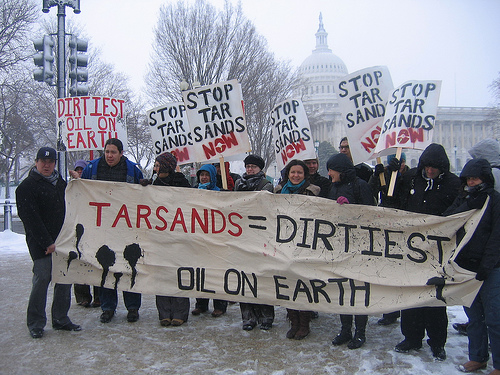 David Daniel is traveling 1,500 miles from the Piney Woods of East Texas to midtown Manhattan this week with a message for Citigroup, the nation’s third-largest bank: Don’t help a Canadian oil pipeline company endanger my community.
David Daniel is traveling 1,500 miles from the Piney Woods of East Texas to midtown Manhattan this week with a message for Citigroup, the nation’s third-largest bank: Don’t help a Canadian oil pipeline company endanger my community.
At today’s Citigroup annual shareholder meeting, CEO Vikram Pandit was taken to task by David Daniel along with RAN’s own Brant Olson for his company’s financing of TransCanada Corp and its proposed Keystone XL pipeline. If approved, the 1,980-mile pipeline would carry tar sands oil from northern Alberta to Gulf Coast refineries.
Citigroup is a major financier of TransCanada Corp. RAN’s research shows that the bank has raised more than $5.8 billion for TransCanada and its related companies since 2007. RAN, along with a coalition of landowners, First Nations, and environmentalists, is calling on Citigroup to cut its ties to the tar sands and help shift investment capital into critical clean energy technologies like green grids and electric transportation.
Daniel, who lives outside of Winnsboro, Tex., about 100 miles east of Dallas, is one of the landowners in five heartland states whose property lies in the path of the proposed Keystone XL pipeline. He is a former stuntman and the founder of Stop Tarsands Oil Pipelines, which is organizing Texas landowners against the Keystone XL project. If the project is approved, he says he’ll build a platform in one of the century-old elms on his land and stand his ground: “If I am in it, they can’t cut the tree down.”
As Daniel said just before the shareholder meeting today:
As a landowner in the path of Keystone XL, my family, just as so many others, has experienced trespassing, broken agreements, lies pertaining to payment for damages, lies about permitting, eminent domain abuse, and a complete disregard for our personal safety. TransCanada labels our land and therefore our lives as ‘low consequence’ and has denied any type of informative warning label to landowners. I have no reason to trust TransCanada with the lives of my family. Mr. Pandit needs to hear about the human consequences of financing this dangerous project.
The $7 billion pipeline project would double the export of Canadian tar sands to the United States. It would carry tar sands oil across Montana, South Dakota, Nebraska, Kansas, Oklahoma and Texas — mostly across private property owned by farmers and ranchers. The route also runs through the Ogallala Aquifer, putting one-third of the groundwater used in American agriculture at risk of contamination from diluted bitumen, a more corrosive product than conventional crude oil.